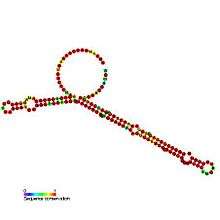Hepatitis C alternative reading frame stem-loop
Hepatitis C alternative reading frame stem-loop is a conserved secondary structure motif identified in the RNA genome of the Hepatitis C virus (HCV) which is proposed to have an important role in regulating translation and repression of the viral genome.
| Hepatitis C alternative reading frame stem-loop | |
|---|---|
 Predicted secondary structure and sequence conservation of HCV_ARF_SL | |
| Identifiers | |
| Symbol | HCV_ARF_SL |
| Rfam | RF00620 |
| Other data | |
| RNA type | Cis-reg |
| Domain(s) | Viruses |
| SO | 0000233 |
| PDB structures | PDBe |
The core protein-coding region of the Hepatitis C virus (HCV) genome contains a +1 alternative reading frame (ARF) and two proposed phylogenetically conserved RNA helix-forming stem loop structures (IV and VII).[1] The proteins translated from the ARF appear to be translated during the normal viral life cycle but are not essential to virus replication.[1] The two predicted stem loops shown here (SLV and SLVI) are proposed to be important for HCV translation and repression; these stem loops are located downstream of the Internal ribosome entry site (IRES) but their functional role is unknown.[1]
References
- McMullan LK, Grakoui A, Evans MJ, Mihalik K, Puig M, Branch AD, Feinstone SM, Rice CM (2007). "Evidence for a functional RNA element in the hepatitis C virus coregene". Proc Natl Acad Sci USA. 104 (8): 2879–2884. Bibcode:2007PNAS..104.2879M. doi:10.1073/pnas.0611267104. PMC 1815275. PMID 17299041.